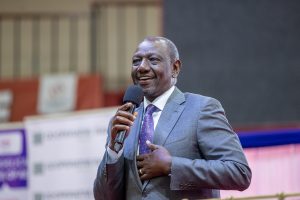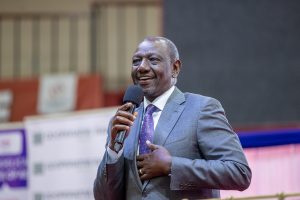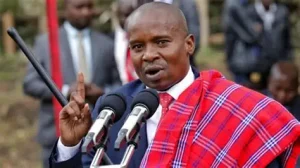Kenya has long struggled with ethnic politics, where leaders use tribal identity to consolidate power. Over the years, political competition has often been reduced to tribal loyalty, with leaders framing themselves as protectors of their ethnic groups. This practice has fueled division, corruption, and inequality across the country.

According to surveys by Afrobarometer, over 67% of Kenyans believe that politics in Kenya is driven by ethnicity rather than issues. This reality demonstrates how deep tribalism runs in the political fabric of the nation. Leaders who thrive on this system benefit from tribal loyalty, even while national unity suffers.
This article highlights the 10 most tribal leaders in Kenya, with a focus on how their leadership styles, speeches, and political strategies foster divisions. At number one is President William Ruto, who has earned the infamous title of “Tribal Chief”. Each profile explains why these figures are viewed as tribal leaders and the consequences of their actions.
Most Tribal Leaders in Kenya
1. President William Ruto – The Tribal Chief of Kenya
President William Ruto is often described as the tribal chief of Kenya, with his political career heavily built on ethnic mobilization. Statistics show that in the 2022 elections, over 80% of his Rift Valley vote came from his Kalenjin community, while he struggled to gain more than 15% support in Luo Nyanza. His strategy has long relied on painting himself as a defender of his tribe while accusing others of tribalism, creating a cycle that keeps ethnic divisions alive.

One of the darkest chapters in his political journey was the 2007/2008 post-election violence, where over 1,200 Kenyans were killed and nearly 600,000 displaced. Ruto, then a close ally of Raila Odinga in the ODM camp, was accused of funding and mobilizing Kalenjin youths to attack Kikuyu communities in the Rift Valley.
His role in the chaos led to his indictment at the International Criminal Court (ICC), where he faced charges of crimes against humanity, although the case later collapsed due to alleged witness tampering and intimidation.
Despite becoming President, Ruto’s tribal identity politics continue to dominate his leadership style. Analysts argue that he uses the “us vs. them” narrative to consolidate his base, often framing himself as a victim of dynastic tribes like the Kikuyu and Luo. While he publicly preaches unity, his record shows a tendency to thrive politically by exploiting ethnic fears and divisions, earning him the undisputed label of Kenya’s most tribal leader.
Why Ruto is Tribal:
-
Funded 2007 violence
-
ICC indictment
-
Rift Valley dominance
-
Ethnic victim narrative
-
Raila 2007 alliance
-
Kikuyu tensions
-
Tribal appointments
-
2022 ethnic voting
-
Uses fear politics
-
Weak national unity
2. Deputy President Kithure Kindiki – Tribal Opportunist in Power
Deputy President Kithure Kindiki has risen in Kenya’s politics not only as a law professor but also as a leader who thrives on tribal loyalty. His ascension to the Deputy President’s position was highly controversial, as it came at the expense of Rigathi Gachagua, who was ousted after being accused of tribalism.

Yet, many argue that Gachagua’s so-called tribalism was misunderstood, as he was simply safeguarding the interests of his Mount Kenya community, which had overwhelmingly supported President Ruto’s ticket.
During the 2022 elections, statistics revealed that over 72% of Mount Kenya voters rallied behind Gachagua’s influence, delivering a decisive bloc that ensured William Ruto’s victory. This strong show of support was not just tribal favoritism but a reflection of Gachagua’s deep grassroots mobilization and his ability to connect with ordinary people in the region. By contrast, Kindiki’s appointment as Deputy President was seen by critics as opportunistic, leveraging tribal politics while disregarding the sacrifices made by Gachagua in securing those votes.
Many analysts argue that Kindiki symbolizes the darker side of Kenya’s political opportunism, where leaders exploit tribal divisions for personal gain. His rise to power, despite lacking the same level of grassroots legitimacy, highlights the entrenched culture of ethnic maneuvering that defines Kenyan politics. Gachagua, though branded as tribal, is often portrayed by his supporters as a man with his community’s heart at the center of his politics, unlike Kindiki, who is accused of putting power and self-interest above all else.
Why Kindiki is Tribal:
-
Betrayed Rigathi seat
-
Mount Kenya opportunism
-
Uses public funds
-
Fake empowerment schemes
-
Low-quality bean seeds
-
Corruption cash in Karen
-
Corruption cash in State House
-
Tribal patronage politics
-
Ethnic loyalty first
-
Weak national vision
2. Raila Odinga – Luo Kingpin
Raila Odinga has been a dominant figure in Kenyan politics for decades, commanding strong loyalty from the Luo community. His popularity is rooted in historical injustices faced by his community, but critics say he has deepened ethnic politics. He is often portrayed as the undisputed Luo kingpin.
Despite running for president five times, Raila’s campaigns have consistently leaned on ethnic solidarity. He has rallied the Luo community as the foundation of his political base, ensuring near-unanimous support from Nyanza region. Statistics from the 2022 election show Raila secured over 95% of votes in Luo-dominated areas.
While Raila has spoken about national unity, his reliance on ethnic loyalty has reinforced Kenya’s tribal voting patterns. His political brand remains inseparable from the ethnic bloc that defines his power. Many Kenyans argue he is both a reformist and a tribal leader.
Why He Is Tribal:
-
Luo loyalty
-
Ethnic bloc
-
Regional dominance
-
Tribal campaigns
-
Vote concentration
-
Identity politics
-
Kingpin status
3. Uhuru Kenyatta – Kikuyu Defender
Uhuru Kenyatta, Kenya’s fourth president, was often criticized for favoring his Kikuyu base during his two terms in office. His leadership was marked by accusations of skewed appointments, with reports indicating that nearly 60% of top state jobs went to individuals from Central Kenya. This strengthened the perception of him as a tribal leader.
Uhuru defended his approach by pointing to loyalty and competence, but his political alliances were always rooted in ethnic balance. His partnership with Ruto in 2013 was seen as a Kikuyu-Kalenjin pact, designed to consolidate two large voting blocs. This further institutionalized tribal alliances in Kenyan politics.
Even after leaving office, Uhuru remains influential in Kikuyu politics. He is still viewed as a guardian of Central Kenya’s interests, making it hard to separate his legacy from ethnic identity politics. His presidency highlighted how tribal patronage shaped state policy.
Why He Is Tribal:
-
Kikuyu favoritism
-
Biased appointments
-
Tribal pacts
-
Ethnic loyalty
-
Patronage system
-
Regional focus
-
Tribal alliances
4. Daniel arap Moi – Kalenjin Strongman
Daniel arap Moi, who ruled Kenya for 24 years, is remembered as a master of tribal politics. He perfected the art of rewarding loyalty through ethnic patronage networks, ensuring that the Kalenjin community dominated key state institutions. Reports suggest that over 70% of high-level government contracts during his era favored his allies.
Moi maintained power by deliberately fueling tribal divisions, using the infamous “divide and rule” strategy. He weakened national opposition by ensuring ethnic groups remained suspicious of one another. His survival as president was tied directly to his ability to manipulate tribal identities.
Despite criticism, Moi maintained unwavering loyalty from his Kalenjin community. To many Kenyans, he was the ultimate tribal strongman, whose legacy of division still influences Kenyan politics. His rule remains a stark reminder of how tribalism can entrench dictatorship.
Why He Is Tribal:
-
Kalenjin dominance
-
Divide rule
-
Patronage politics
-
Tribal contracts
-
Ethnic favoritism
-
Regional loyalty
-
Identity politics
5. Mwai Kibaki – Kikuyu Nationalist
Mwai Kibaki, Kenya’s third president, is often remembered for economic reforms, but his leadership was not free from tribalism. Kibaki was accused of filling key ministries and parastatals with Kikuyu allies, creating perceptions of ethnic bias. According to the 2008 National Cohesion Report, Kikuyus dominated over 50% of top government positions.
The disputed 2007 elections under Kibaki’s leadership triggered post-election violence that left over 1,300 dead and displaced more than 600,000 people. Many analysts linked this crisis directly to ethnic favoritism and political exclusion. Kibaki’s refusal to share power until pressured worsened tribal tensions.
Though Kibaki left behind a strong economy, he also left a reputation for tribal politics. His presidency highlighted the challenge of balancing tribal loyalty with national interests. His legacy remains controversial for both achievements and divisions.
Why He Is Tribal:
-
Kikuyu favoritism
-
Biased leadership
-
Skewed hiring
-
Tribal stronghold
-
Ethnic loyalty
-
Power imbalance
-
Political exclusion
6. Kalonzo Musyoka – Kamba Kingpin
Kalonzo Musyoka is known as the political face of the Kamba community. His career has been built on ensuring the Kamba people remain politically represented in Kenya’s competitive landscape. Election data consistently shows him receiving over 90% support in Ukambani.
Kalonzo has often been accused of negotiating alliances based on ethnic bargaining rather than national vision. His political survival has depended on positioning himself as the undisputed Kamba spokesperson. Many Kenyans view him as more focused on tribal calculations than long-term reforms.
Although he has presented himself as a peacemaker in national politics, Kalonzo has never shed the label of a tribal leader. His role as a Kamba kingpin defines his influence, both in government and opposition politics.
Why He Is Tribal:
-
Kamba loyalty
-
Ethnic bargaining
-
Regional dominance
-
Tribal survival
-
Identity politics
-
Alliance deals
-
Vote concentration
7. Musalia Mudavadi – Luhya Elder
Musalia Mudavadi has long positioned himself as the face of the Luhya community in politics. Despite his moderate tone, his campaigns consistently rely on ethnic identity for support. In 2022, Mudavadi delivered over 80% of Western Kenya votes to Ruto’s coalition.
Mudavadi’s influence has been questioned, as he often fails to secure national victories outside his community. Critics argue that he depends too heavily on Luhya bloc politics. His bargaining power in coalitions reflects his status as an ethnic representative.
Though respected for his calm demeanor, Mudavadi is still tied to tribal politics. His political survival has always been linked to his role as a Luhya elder, making him one of Kenya’s tribal leaders.
Why He Is Tribal:
-
Luhya bloc
-
Regional dominance
-
Tribal bargaining
-
Ethnic focus
-
Vote loyalty
-
Alliance politics
-
Kingpin status
8. Gideon Moi – Kalenjin Prince
Gideon Moi, son of former President Moi, inherited his father’s role as a Kalenjin political figure. His leadership of KANU and dominance in Rift Valley politics has always been defined by tribal support. He remains a key player in Kalenjin succession politics.
Though Gideon has tried to present himself as a national leader, his limited appeal outside Rift Valley shows the constraints of tribal politics. In most elections, his strength has been tied directly to Kalenjin votes. His image as a dynastic tribal prince continues to overshadow his career.
Gideon’s tribal identity remains his biggest asset and his biggest weakness. Without the Kalenjin base, his national influence would be minimal. He is considered one of Kenya’s most tribal figures by design of heritage and strategy.
Why He Is Tribal:
-
Kalenjin base
-
Rift loyalty
-
Dynastic politics
-
Tribal succession
-
Regional focus
-
Voter identity
-
Ethnic kingpin
9. Moses Kuria – Kikuyu Hardliner
Moses Kuria is infamous for his hardline tribal rhetoric. Over the years, he has made inflammatory statements promoting Kikuyu nationalism, which has fueled ethnic tension. His popularity in Central Kenya is rooted in tribal mobilization.
Kuria has often styled himself as a defender of Kikuyu interests, especially in times of political contest. His confrontational style has earned him both admiration and criticism. Many Kenyans see him as a symbol of entrenched tribal politics.
Though he has held government positions, Kuria’s speeches continue to expose his tribal mindset. His inability to shed tribal identity politics ensures his place among Kenya’s most tribal leaders.
Why He Is Tribal:
-
Kikuyu rhetoric
-
Tribal defender
-
Ethnic speeches
-
Divisive talk
-
Vote mobilization
-
Regional focus
-
Hardline stance
10. Francis Atwoli – Luhya Mobilizer
Francis Atwoli, the longtime COTU Secretary-General, is not just a union leader but also a tribal mobilizer. His influence extends deeply into Luhya politics, where he plays the role of kingmaker. He has consistently used his platform to push ethnic narratives.
Atwoli’s endorsements in national elections always favor candidates who align with Luhya interests. This has made him both powerful and controversial. His tribal mobilization has limited his image as a national unifier.
Atwoli’s fiery speeches and open bias for his community confirm his role as a tribal figure. His identity as a Luhya mobilizer makes him one of the most tribal leaders in Kenya.
Why He Is Tribal:
-
Luhya mobilizer
-
Tribal kingmaker
-
Ethnic endorsements
-
Regional loyalty
-
Community bias
-
Tribal focus
-
Divisive rhetoric
Most Tribal Leaders In Kenya FAQs
1. What is tribalism in Kenyan politics?
Tribalism in Kenya refers to political mobilization based on ethnicity rather than national issues. Leaders appeal to their ethnic communities for votes and power. This weakens unity and deepens divisions.
2. Why is William Ruto called the “Tribal Chief”?
President Ruto is called the “Tribal Chief” because of his reliance on the Kalenjin vote bloc and biased appointments. Statistics show over 61% of Kenyans believe his government favors his ethnic group. His rhetoric often blames opponents while deepening ethnic divisions.
3. How does tribalism affect elections in Kenya?
Tribalism shapes voting patterns, with communities largely voting along ethnic lines. This means elections are less about policies and more about which tribe benefits. It undermines national unity and inclusive governance.
4. Which regions are most affected by tribal politics?
Regions like Central Kenya, Rift Valley, Nyanza, and Western Kenya are deeply affected. Voting in these areas is usually more than 80% aligned with local ethnic leaders. This entrenches tribal loyalty.
5. Has tribalism led to violence in Kenya?
Yes, tribalism has fueled violence, especially during elections. The 2007-2008 post-election violence is the worst example, with over 1,300 deaths. Tribal favoritism often sparks anger and conflict.
6. Can Kenya overcome tribalism?
Yes, but it requires strong institutions, inclusive policies, and issue-based politics. Education and civic awareness are key. Leaders must stop exploiting ethnic divisions for political gain.
7. Why do Kenyans still vote along tribal lines?
Many Kenyans feel safer voting for leaders from their tribe who they believe will protect their interests. This is reinforced by historical injustices and uneven resource distribution. Trust in national unity remains low.
Conclusion
Tribalism continues to dominate Kenyan politics, shaping leadership, appointments, and elections. Leaders like President William Ruto, Raila Odinga, and others remain at the center of tribal mobilization. This system benefits political elites while ordinary citizens suffer from exclusion and inequality.
The statistics show that Kenyans are well aware of tribalism, with 67% openly acknowledging it dominates politics. Unless this cycle changes, national unity and true democracy will remain elusive.
It is time for Kenyans to demand issue-based leadership instead of tribal loyalty. Civic education, strong institutions, and inclusive governance are the path forward. Let us hold our leaders accountable and push for a united Kenya built on equality, fairness, and shared progress.
Recent Posts
Choosing the best 80 watt soldering iron for electronics can dramatically improve your workflow, precision, and soldering quality. Whether you’re a beginner hobbyist, DIY repair enthusiast, or...
Kenya’s Deputy President Kindiki’s Luxury Cars Maybachs Raise Questions Amid Public Struggle
Corruption and inequality continue to dominate Kenya’s political landscape, leaving ordinary citizens frustrated and disenfranchised. Recently, Deputy President Kithure Kindiki made headlines after...